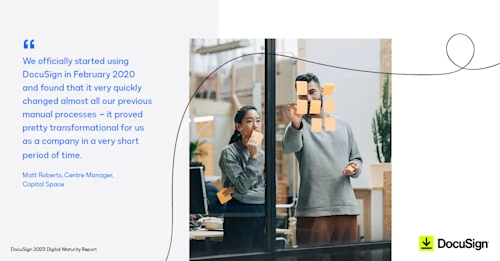
2023 Digital Maturity Report Highlights
This report explores the challenges, attitudes and opportunities around evolving digital strategies when it comes to delivering the new future of work.

A staggering 31% of respondents in the Docusign 2023 Digital Maturity Report stated they would consider leaving their roles in the next 12 months, with a further 29% asserting they are considering leaving when macroeconomic conditions improve.
The dynamics of company culture are changing as organisations are pressing ahead, sometimes with fewer resources. It also seems clear that for employees, there is a drive for a smarter work/life balance while meeting the needs of working in leaner teams.
In this article, we look at the highlights from the Docusign 2023 Digital Maturity Report and explore how digital technology and eSignature solutions could help provide solutions for a more balanced work future.
The report benchmarks attitudes and perceptions of 1,800 business decision-makers in Europe evenly distributed across France, Germany, and the UK & Ireland. It covers the challenges, attitudes and ultimate opportunities around evolving digital strategies when it comes to delivering the new future of work.
Why do some employees want to leave their roles?
The report covers the main reasons employees are considering leaving their roles, with 31% stating frustrations with current systems, processes, and ways of working and 26% a lack of upskilling or development opportunities.
Wanting to work for a more digital-forward company with the right infrastructure, processes and systems in place motivates 27% of those looking to change jobs, rising to 34% of C-level decision-makers. The report also discovered that workers, on average, are wasting around 12 hours per week on low-value, repetitive tasks - 8 hours of which could be automated.
46% of respondents state they would like to spend more time on a forward-looking strategy
44% would like to spend more time on more high-value tasks
35% are looking to allocate less time to low-value tasks
Interestingly, respondents working for start-ups spend less time on these tasks, suggesting scale quickly impacts the total time lost to outdated processes and that it's even more critical that organisations have scalable systems to combat this as they grow.
Ronan Copeland, Group VP and General Manager, EMEA, at Docusign, says, "This survey surfaces the disturbing fact that employees are wasting a staggering 12 hours per week on low-value tasks. Finding ways to enable staff to focus on more valuable tasks and drive forward-facing strategies is vital. The deployment of the right digital strategy and processes will not only build in the right business resilience but will also curb a potential exodus of skills and top talent."
Driving staff retention with digital maturity
Retaining, attracting, and developing talent is essential for an organisation's overall resilience and growth. Employees and business decision-makers are eager to close the gap between what they desire from work and the everyday reality of their roles. They want to replace days spent on low-value administration and execution with high-impact deep work and forward-thinking strategies that engage them and drive the business forward.
Over-reliance on manual or outdated processes and systems creates frustrations that hinder productivity and performance and can even drive workers to seek new opportunities. Start-ups have an advantage over larger organisations concerning staff retention, with only 22% of respondents considering leaving their roles, compared to 39% at SMEs and 32% at enterprises. In addition, only 29% of respondents working at organisations with a very high digital maturity are considering leaving their roles in the next 12 months, compared to 43% of those with low digital maturity.
The report shows that a third of those who already plan to leave their jobs want to work for more digital-forward companies because they are frustrated with the current systems and processes they are required to use. What's more, 1-in-4 decision makers would consider moving roles due to frustration with systems, processes or ways of working.
European business leaders face continued economic pressures and workplace challenges that drive the need to innovate and introduce new working methods. Businesses that focus on digitisation removing frictions, and reducing the time it takes to deliver - whether closing a deal, signing a contract, or pivoting an approach - stand to gain significant competitive advantages and are more likely to retain talent. Organisations with 'very high' digital maturity are 3x more likely to have transformative resilience - that is to say, they are able to not only adapt to disruptions but also innovate and thrive in the face of disruptive challenges.
Digitising for a better future
There is a compelling need for business leaders to proactively drive digital transformation forward to meet the challenges of stakeholder and employee demands. Almost every business plans to be a digital-first company in the future — if they aren't already. Digital-first organisations are those that have orientated their business models, corporate culture, and organisational structures to take full advantage of digital technologies.
Companies must recognise that talented people who want to work for digital-first companies will look for those organisations that are not held back by outdated processes and ways of working. Organisations looking to bolster resilience and prepare their business infrastructures for a more digitally intuitive future should look at current digital transformation strategies and identify where improvements or strategy pivots can or should be made.
65% already recognise they have a skills gap within their operations, and 45% are making reskilling, upskilling and training talent a top strategy.
The emergence of generative Artificial Intelligence (AI) is bringing a radically disruptive influence on workplaces few could have imagined even just 12 months ago. Organisations are introducing new technology to help plug the gap, such as introducing ChatGPT.
Half are investing in digital contract management solutions
35% believe in reducing inefficiencies from manual processes and the onboarding of new customers, vendors and partners
43% are investing more in digital tools or automation
62% of decision-makers believe they are currently focused on digital improvement or modernisation strategies that improve the use of digital tools already deployed rather than changing the way technology is used across the business.
The report results highlight that having the right tools and digital strategy in place is vital at every step along the value chain if a business is to achieve better resilience. Digital skills gaps need to be reduced and value-added across the business.
Ronan Copeland, Group VP and General Manager, EMEA, at Docusign, says, "The current macroeconomic challenges are such that assessing the efficiency of internal processes is a key strategy to increasing ROI and maximising expenditure. This can be achieved by assessing which manual and outdated tasks and processes across the business ecosystem can be eliminated by simply going digital. By instilling a strategy of evaluation and change, organisations, regardless of size, can energise employees through smarter ways, while delivering faster times to value for the business."

Discover more about the Future of Work from the Docusign Digital Maturity Report 2023. DocuSign helps organizations streamline processes and automate how they navigate their systems of agreements. This can be a real benefit to automating internal processes and reducing the amount employees spend on admin, contributing to a smarter work/life balance.

Related posts
Docusign IAM is the agreement platform your business needs



